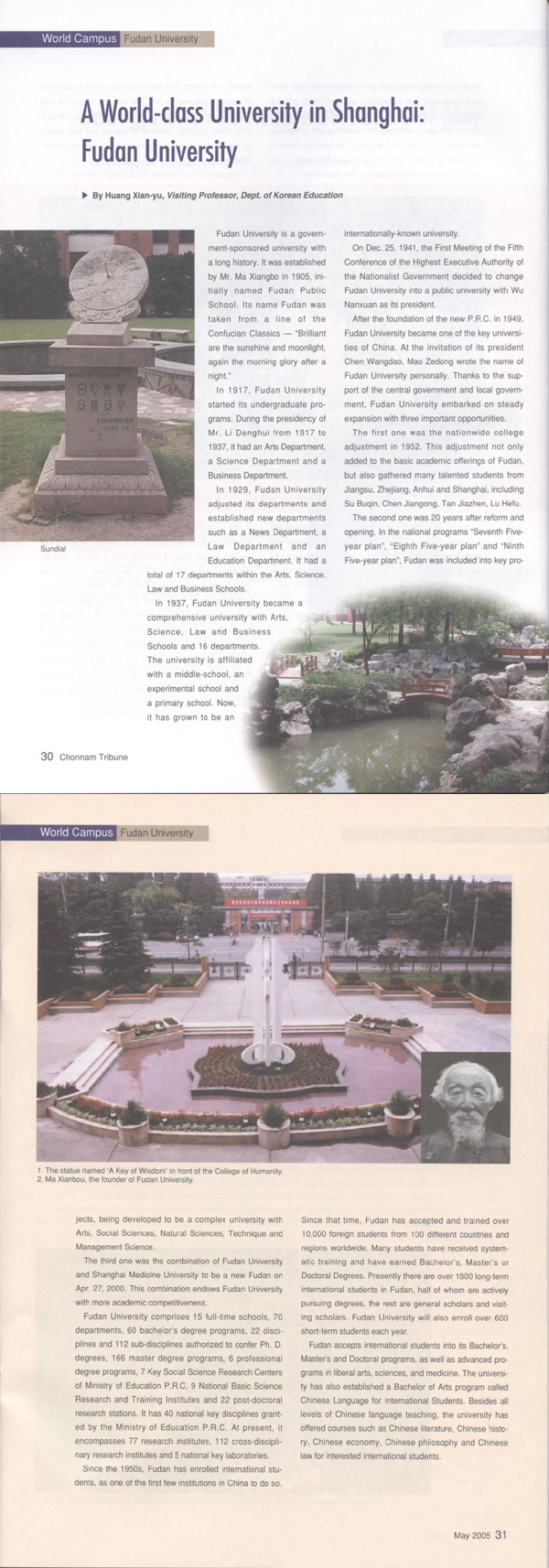푸단대학교

A World - class University in Shanghai: Fudan University
Fudan University is a government-sponsored university with a long history. It was established by Mr. Ma Xiangbo in 1905, initially named Fudan Public School. Its name “Fudan” was taken from a line of the Confucian Classics --- “Brilliant are the sunshine and moonlight, again the morning glory after a night.”
In 1917, Fudan University started its undergraduate programs. During the presidency of Mr. Li Denghui from 1917 to 1937, it had an Arts Department, a Science Department and a Business Department.
In 1929, Fudan University adjusted its departments and established new departments such as a News Department, a Law Department and an Education Department. It had a total of 17 departments within the Arts, Science, Law and Business Schools.
In 1937, Fudan University became a comprehensive university with Arts, Science, Law and Business Schools and 16 departments. The University is affiliated with a middle-school, an experimental school and a primary school. Now, it has grown to be an internationally-known university.
On Dec. 25, 1941, the First Meeting of the Fifth Conference of the Highest Executive Authority of the Nationalist Government decided to change Fudan University into a public university with Wu Nanxuan as its president.
After the foundation of the new P.R.C. in 1949, Fudan University became one of the key universities of China. At the invitation of its president Chen Wangdao, Mao Zedong wrote the name of Fudan University personally. Thanks to the support of the central government and local government, Fudan University embarked on steady expansion with three important opportunities.
The first one was the nationwide college adjustment in 1952. This adjustment not only added to the basic academic offerings of Fudan, but also gathered many talented students from Jiangsu, Zhejiang, Anhui and Shanghai, including Su Buqin, Chen Jiangong, Tan Jiazhen, Lu Hefu.
The second one was 20 years after reform and opening. In the national programs “Seventh Five-year plan”, “Eighth Five-year plan” and “Ninth Five-year plan”, Fudan was included into key projects, being developed to be a complex university with Arts, Social Sciences, Natural Sciences, Technique and Management Science.
The third one was the combination of Fudan University and Shanghai Medicine University to be a new Fudan on Apr. 27, 2000. This combination endows Fudan University with more academic competitiveness.
Fudan University comprises 15 full-time schools, 70 departments, 60 bachelor's degree programs, 22 disciplines and 112 sub-disciplines authorized to confer Ph. D. degrees, 166 master degree programs, 6 professional degree programs, 7 Key Social Science Research Centers of Ministry of Education P.R.C, 9 National Basic Science Research and Training Institutes and 22 post-doctoral research stations. It has 40 national key disciplines granted by the Ministry of Education P.R.C. At present, it encompasses 77 research institutes, 112 cross-disciplinary research institutes and 5 national key laboratories.
Since the 1950s, Fudan has enrolled international students, as one of the first few institutions in China to do so. Since that time, Fudan has accepted and trained over 10,000 foreign students from 100 different countries and regions worldwide. Many students have received systematic training and have earned Bachelor's, Master's or Doctoral Degrees. Presently there are over 1800 long-term international students in Fudan, half of whom are actively pursuing degrees, the rest are general scholars and visiting scholars. Fudan University will also enroll over 600 short-term students each year.
Fudan accepts international students into its Bachelor’s, Master’s and Doctoral programs, as well as advanced programs in liberal arts, sciences, and medicine. The university has also established a Bachelor of Arts program called Chinese Language for International Students. Besides all levels of Chinese language teaching, the university has offered courses such as Chinese literature, Chinese history, Chinese economy, Chinese philosophy and Chinese law for interested international students.

